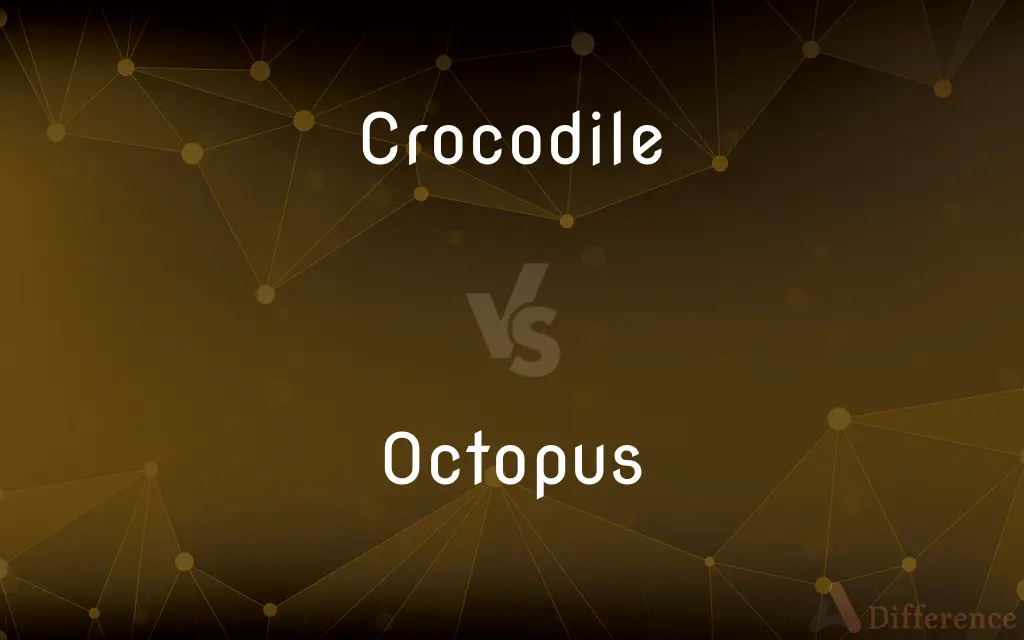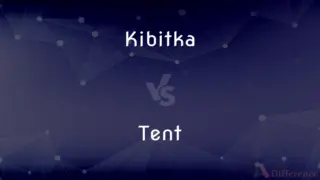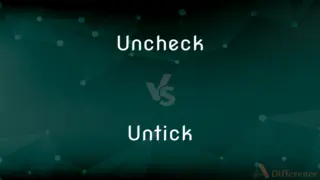Crocodile vs. Octopus — What's the Difference?
By Tayyaba Rehman — Updated on October 27, 2023
Crocodile is a large reptile with strong jaws, while Octopus is a marine creature with eight tentacles.

Difference Between Crocodile and Octopus
Table of Contents
ADVERTISEMENT
Key Differences
Crocodile is a reptile that predominantly lives in freshwater habitats such as rivers, lakes, and wetlands, whereas the Octopus is a marine animal that inhabits various oceanic environments.
While the Crocodile is recognized for its scaly skin and strong jaws, the Octopus is known for its soft body and eight flexible tentacles.
Crocodile species are found across different continents, including Africa, Asia, the Americas, and Australia. In contrast, the Octopus is a globally distributed creature found in almost all oceans.
Crocodile plays a vital role in the ecosystem by maintaining the balance of certain animal populations, whereas the Octopus is an important predator, often using its intelligence to hunt and hide from threats.
In popular culture, Crocodile often symbolizes danger or treachery, while the Octopus might symbolize versatility or multitasking due to its many arms.
ADVERTISEMENT
Comparison Chart
Habitat
Freshwater (rivers, lakes)
Marine (oceans, seas)
Body Characteristics
Scaly skin, strong jaws
Soft body, eight tentacles
Distribution
Certain continents
Almost all oceans
Role in Ecosystem
Maintains animal balance
Predatory role
Symbolism in Culture
Danger, treachery
Versatility, multitasking
Compare with Definitions
Crocodile
A creature with tough, scaly skin.
His boots were made from crocodile skin.
Octopus
A creature known for its intelligence and problem-solving skills.
The octopus quickly figured out how to open the jar.
Crocodile
An animal known for its patience while hunting.
Like a crocodile waiting for its prey, he sat silently.
Octopus
A marine animal with a bulbous head and eight arms.
The octopus camouflaged itself among the corals.
Crocodile
A large aquatic reptile with a long snout and strong jaws.
The crocodile basked on the riverbank, soaking up the sun.
Octopus
A delicacy in various cuisines around the world.
Grilled octopus is a popular dish in Mediterranean cuisine.
Crocodile
Symbolic of danger or treachery in various cultures.
He shed crocodile tears, pretending to care.
Octopus
Octopus (pl. octopuses, see below for variants) are soft-bodied, eight-limbed molluscs of the order Octopoda (, ok-TOP-ə-də).
Crocodile
Crocodiles (family Crocodylidae) or true crocodiles are large semiaquatic reptiles that live throughout the tropics in Africa, Asia, the Americas and Australia. The term crocodile is sometimes used even more loosely to include all extant members of the order Crocodilia, which includes the alligators and caimans (family Alligatoridae), the gharial and false gharial (family Gavialidae), and all other living and fossil Crocodylomorpha.
Octopus
Any of various carnivorous marine cephalopod mollusks chiefly of the family Octopodidae, having a soft body, eight arms with suckers, a large distinct head, and a mouth with a strong beak.
Crocodile
Any of various large aquatic reptiles of the family Crocodylidae that are native to tropical and subtropical regions and have thick, armorlike skin and long tapering jaws.
Octopus
Something, such as a multinational corporation, that has many powerful, centrally controlled branches.
Crocodile
A crocodilian reptile, such as an alligator, caiman, or gharial.
Octopus
Any of several marine molluscs of the family Octopodidae, having no internal or external protective shell or bone (unlike the nautilus, squid and cuttlefish) and eight arms each covered with suckers.
Crocodile
Leather made from crocodile skin.
Octopus
(uncountable) The flesh of these marine molluscs eaten as food.
Crocodile
Chiefly British A line of people, especially pupils or choir members, standing two abreast.
Octopus
An organization that has many powerful branches controlled from the centre.
Crocodile
Any of the predatory amphibious reptiles of the family Crocodylidae; (loosely) a crocodilian, any species of the order Crocodilia, which also includes the alligators, caimans and gavials.
Octopus
To put (or attempt to put) one's fingers, hands or arms in many things or places at roughly the same time.
Crocodile
A long line or procession of people (especially children) walking together.
Octopus
To spread out in long arms or legs in many directions.
Crocodile
(logic) A fallacious dilemma, mythically supposed to have been first used by a crocodile.
Octopus
To plug a large number of devices into a single electric outlet.
Crocodile
(intransitive) To speak one's native language at an Esperanto-language gathering, rather than Esperanto.
Octopus
(by extension) To grow in use vastly beyond what was originally intended.
Crocodile
A large reptile of the genus Crocodilus, of several species. They grow to the length of sixteen or eighteen feet, and inhabit the large rivers of Africa, Asia, and America. The eggs, laid in the sand, are hatched by the sun's heat. The best known species is that of the Nile (Crocodilus vulgaris, or Crocodilus Niloticus). The Florida crocodile (Crocodilus Americanus) is much less common than the alligator and has longer jaws. The name is also sometimes applied to the species of other related genera, as the gavial and the alligator.
Octopus
To hunt and catch octopuses.
Crocodile
A fallacious dilemma, mythically supposed to have been first used by a crocodile.
Octopus
To behave like an octopus.
Crocodile
Large voracious aquatic reptile having a long snout with massive jaws and sharp teeth and a body covered with bony plates; of sluggish tropical waters
Octopus
A genus of eight-armed cephalopods, including numerous species, some of them of large size. See Devilfish.
Crocodile
A term sometimes used for leather made from its hide.
The crocodile handbag was expensive and luxurious.
Octopus
Any member of the genus Octopus.
Octopus
Something resembling an octopus in having numerous controlling arms or branches that reach widely and influence many activities; - used mostly of organizations, such as diversified corporations.
Octopus
Tentacles of octopus prepared as food
Octopus
Bottom-living cephalopod having a soft oval body with eight long tentacles
Octopus
Used metaphorically to represent something with multiple facets or extensions.
The company was like an octopus, with its tentacles in various industries.
Octopus
Symbolic of versatility or multitasking due to its many arms.
With her multitasking skills, she was like an octopus managing various tasks.
Common Curiosities
How many arms does an Octopus have?
An Octopus has eight tentacles or arms.
What type of animal is an Octopus?
An Octopus is a marine animal.
Where do Crocodiles typically live?
Crocodiles predominantly live in freshwater habitats such as rivers, lakes, and wetlands.
How is a Crocodile different from an Alligator?
Among other differences, Crocodiles often have a V-shaped snout, while Alligators have a U-shaped snout.
How do Crocodiles hunt their prey?
Crocodiles are ambush predators, often waiting patiently and then striking quickly.
How does an Octopus defend itself?
Octopuses can use camouflage, ink squirting, and even mimicry as defense mechanisms.
What type of animal is a Crocodile?
A Crocodile is a large aquatic reptile.
How long can a Crocodile live?
Depending on the species, Crocodiles can live from 35 to over 70 years.
Are Octopuses intelligent?
Yes, Octopuses are known for their intelligence and problem-solving skills.
Is it true that Crocodiles cry while eating?
The term "crocodile tears" comes from an old myth, but Crocodiles do have tear glands to lubricate their eyes, not necessarily due to emotion.
Is the Octopus ink harmful?
Octopus ink can be a deterrent to predators, but it's not generally harmful to humans.
Can an Octopus change color?
Yes, many Octopus species can change their color and texture for camouflage or communication.
Are Crocodile attacks on humans common?
While rare, Crocodile attacks on humans do occur, especially if the Crocodile feels threatened or cornered.
What do Octopuses eat?
Octopuses typically eat crustaceans, small fishes, and other small marine animals.
How big can both Crocodiles and Octopuses get?
The size varies by species. Saltwater Crocodiles can reach lengths of over 20 feet, while the Giant Pacific Octopus can have an arm span of up to 14 feet.
Share Your Discovery

Previous Comparison
Kibitka vs. Tent
Next Comparison
Uncheck vs. UntickAuthor Spotlight
Written by
Tayyaba RehmanTayyaba Rehman is a distinguished writer, currently serving as a primary contributor to askdifference.com. As a researcher in semantics and etymology, Tayyaba's passion for the complexity of languages and their distinctions has found a perfect home on the platform. Tayyaba delves into the intricacies of language, distinguishing between commonly confused words and phrases, thereby providing clarity for readers worldwide.















































